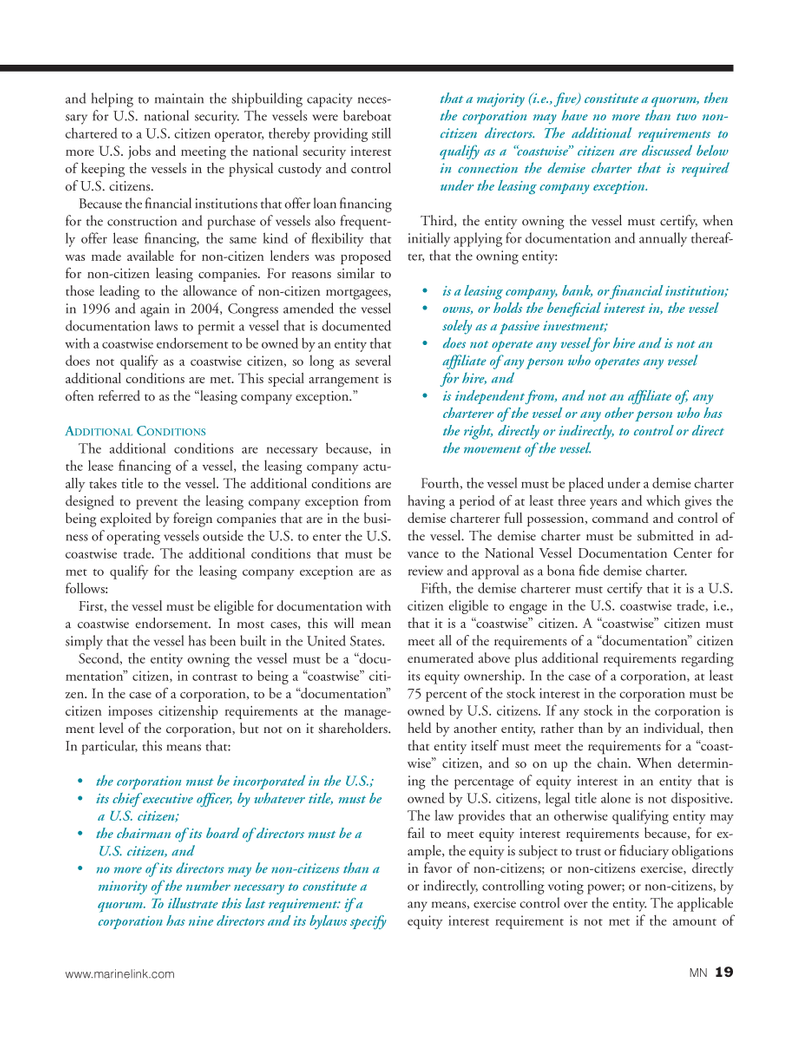
Page 19: of Marine News Magazine (December 2013)
Innovative Products & Boats of 2012
Read this page in Pdf, Flash or Html5 edition of December 2013 Marine News Magazine
and helping to maintain the shipbuilding capacity neces-sary for U.S. national security. The vessels were bareboat chartered to a U.S. citizen operator, thereby providing still more U.S. jobs and meeting the national security interest of keeping the vessels in the physical custody and control of U.S. citizens. Because the Þ nancial institutions that offer loan Þ nancing for the construction and purchase of vessels also frequent- ly offer lease Þ nancing, the same kind of ß exibility that was made available for non-citizen lenders was proposed for non-citizen leasing companies. For reasons similar to those leading to the allowance of non-citizen mortgagees, in 1996 and again in 2004, Congress amended the vessel documentation laws to permit a vessel that is documented with a coastwise endorsement to be owned by an entity that does not qualify as a coastwise citizen, so long as several additional conditions are met. This special arrangement is often referred to as the Òleasing company exception.Ó ADDITIONAL CONDITIONSThe additional conditions are necessary because, in the lease Þ nancing of a vessel, the leasing company actu- ally takes title to the vessel. The additional conditions are designed to prevent the leasing company exception from being exploited by foreign companies that are in the busi- ness of operating vessels outside the U.S. to enter the U.S. coastwise trade. The additional conditions that must be met to qualify for the leasing company exception are as follows: First, the vessel must be eligible for documentation with a coastwise endorsement. In most cases, this will mean simply that the vessel has been built in the United States. Second, the entity owning the vessel must be a Òdocu- mentationÓ citizen, in contrast to being a ÒcoastwiseÓ citi- zen. In the case of a corporation, to be a ÒdocumentationÓ citizen imposes citizenship requirements at the manage- ment level of the corporation, but not on it shareholders. In particular, this means that: the corporation must be incorporated in the U.S.; its chief e xecutive of cer, by whatever title, must be a U.S. citizen; the chairman of its board of directors must be a U.S. citizen, and no more of its directors may be non-citizens than a minority of the number necessary to constitute a quorum. To illustrate this last requirement: if a corporation has nine directors and its bylaws specify that a majority (i.e., ve) constitute a quorum, then the corporation may have no more than two non- citizen directors. The additional requirements to qualify as a ?coastwise? citizen are discussed below in connection the demise charter that is required under the leasing company exception. Third, the entity owning the vessel must certify, when initially applying for documentation and annually thereaf- ter, that the owning entity: is a leasing company, bank, or nancial institution; owns, or holds the bene cial interest in, the vessel solely as a passive investment; does not operate any vessel for hire and is not an af liate of any person who operates any vessel for hire, and is independent from, and not an af liate of, any charterer of the vessel or any other person who has the right, directly or indirectly, to control or direct the movement of the vessel. Fourth, the vessel must be placed under a demise charter having a period of at least three y ears and which gives the demise charterer full possession, command and control of the vessel. The demise charter must be submitted in ad- vance to the National Vessel Documentation Center for review and approval as a bona Þ de demise charter. Fifth, the demise charterer must certify that it is a U.S. citizen eligible to engage in the U.S. coastwise trade, i.e., that it is a ÒcoastwiseÓ citizen. A ÒcoastwiseÓ citizen must meet all of the requirements of a ÒdocumentationÓ citizen enumerated above plus additional requirements regarding its equity ownership. In the case of a corporation, at least 75 percent of the stock interest in the corporation must be owned by U.S. citizens. If any stock in the corporation is held by another entity, rather than by an individual, then that entity itself must meet the requirements for a Òcoast- wiseÓ citizen, and so on up the chain. When determin- ing the percentage of equity interest in an entity that is owned by U.S. citizens, legal title alone is not dispositive. The law provides that an otherwise qualifying entity may fail to meet equity interest requirements because, for ex- ample, the equity is subject to trust or Þ duciary obligations in favor of non-citizens; or non-citizens exercise, directly or indirectly, controlling voting power; or non-citizens, by any means, exercise control over the entity. The applicable equity interest requirement is not met if the amount of MN 19www.marinelink.com MN Dec2013 Layout 18-31.indd 19MN Dec2013 Layout 18-31.indd 1911/25/2013 12:43:41 PM11/25/2013 12:43:41 PM

 18
18

 20
20
